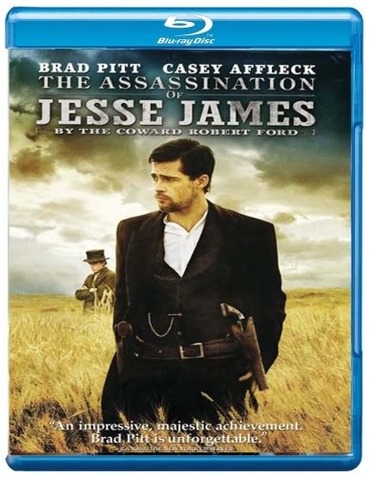










Of all the movies made about or glancingly involving the 19th-century outlaw Jesse Woodson James, "The Assassination of Jesse James by the Coward Robert Ford" is the most reflective, most ambitious, most intricately fascinating, and indisputably most beautiful. Based on the novel of the same name by Ron Hansen, it picks up James late in his career, a few hours before his final train robbery, then covers the slow catastrophe of the gang's breakup over the next seven months even as the boss himself settles into an approximation of genteel retirement. But in another sense all of the movie is later than that. The very title assumes the audience's familiarity with James as a figure out of history and legend, and our awareness that he was--will be--murdered in his parlor one quiet afternoon by a back-shooting crony.
The film--only the second to be made by New Zealand–born writer-director Andrew Dominik--reminds us that Dominik's debut film, "Chopper", was the cunningly off-kilter portrait of another real-life criminal psychopath who became a kind of rock star to his society. The Jesse James of this telling is no Robin Hood robbing the rich to give to the poor, and that train robbery we witness is punctuated by acts of gratuitous brutality, not gallantry. Nineteen-year-old Bob Ford (Casey Affleck) seeks to join the James gang out of hero worship stoked by the dime novels he secretes under his bed, but his glam hero (Brad Pitt) is a monster who takes private glee in infecting his accomplices with his own paranoia, then murdering them for it. In the careful orchestration of James's final moments, there's even a hint that he takes satisfaction in his own demise. Affleck and Pitt (who co-produced with Ridley Scott, among others) are mesmerising in the title roles, but the movie is enriched by an exceptional supporting cast: Sam Shepard as Jesse's older, more stable brother Frank; Sam Rockwell as Bob Ford's own brother Charlie, whose post-assassination descent into madness is astonishing to behold; Paul Schneider, Garret Dillahunt, and Jeremy Renner as three variously doomed gang members; and Mary-Louise Parker, who as Jesse's wife Zee has few lines yet manages with looks and body language to invoke a well nigh-novelistic back-story for herself. There are also electrifying cameos by James Carville, doing solid actorly work as the governor of Missouri; Ted Levine, as a lawman of antic spirit; and Nick Cave, composer of the film's score (with Warren Ellis) and screenwriter of the Aussie western The Proposition, suddenly towering over a late scene to perform the folk song that set the terms for the book and movie's title.
Still, the real co-star is Roger Deakins, probably the finest cinematographer at work today. The landscapes of the movie (mostly in Alberta and Manitoba) will linger in the memory as long as the distinctive faces, and we seem to feel the sting of its snows on our cheeks. Interior scenes are equally persuasive. Few westerns have conveyed so tangibly the bleakness and austerity of the spaces people of the frontier called home, and sought in vain to warm with human spirit. --Richard T. Jameson
| Brad Pitt | Jesse James |
| Mary-Louise Parker | Zee James |
| Brooklynn Proulx | Mary James |
| Dustin Bollinger | Tim James |
| Casey Affleck | Robert Ford |
| Sam Rockwell | Charley Ford |
| Jeremy Renner | Wood Hite |
| Sam Shepard | Frank James |
| Garret Dillahunt | Ed Miller |
| Paul Schneider | Dick Liddil |
| Joel McNichol | Express Messenger |
| James Defelice | Baggagemaster |
| J.C. Roberts | Engineer |
| Darrell Orydzuk | Ukranian Train Passenger |
| Jonathan Erich Drachenberg | Young Train Passenger |

